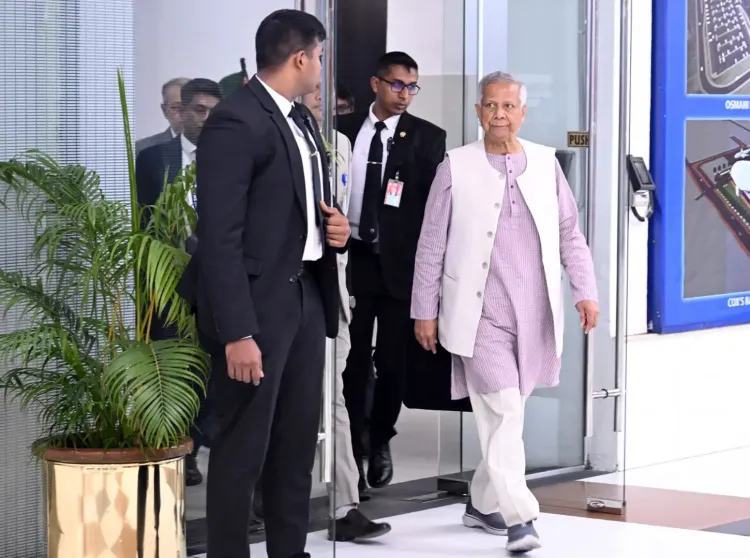Have ISI and DGFI Established a Joint Intelligence Mechanism Amidst Strengthening Pakistan-Bangladesh Relations?

Synopsis
Key Takeaways
- Bangladesh is becoming a strategic ally for Pakistan.
- Joint Intelligence Mechanism established between ISI and DGFI.
- Increased military cooperation and arms deals are on the horizon.
- India must remain vigilant due to potential security risks.
- Historical tensions may be easing between Pakistan and Bangladesh.
New Delhi, Oct 29 (NationPress) Bangladesh has emerged as a new hub for the ISI since Muhammad Yunus assumed leadership, leading to a surge in visits by Pakistani officials to the country. India has been vigilant during the recent four-day trip of General Sahir Shamshad Mirza, Pakistan’s Chairman of the Joint Chiefs of Staff Committee, to Bangladesh.
During this visit, he engaged in discussions with Muhammad Yunus, the Chief Adviser to the interim government, as well as the country’s military leadership.
These meetings indicate a growing military alignment between Bangladesh and Pakistan, raising concerns due to the inclusion of an ISI official in the delegation.
Sources disclose that the presence of ISI officials was intended to facilitate intelligence sharing with the DGFI.
A decision was reached for the DGFI and ISI to collaborate closely, resulting in the establishment of a Joint Intelligence Mechanism.
Officials have warned that India must remain vigilant due to this development. This joint mechanism aims to monitor the Bay of Bengal and closely observe the airspace along India’s eastern flank.
Additionally, a significant development includes the formation of a specialized ISI cell within the Pakistan High Commission in Dhaka. This cell aims to foster cooperation between the ISI, DGFI, and Bangladesh’s National Security Intelligence.
An official from the Intelligence Bureau noted that the cell's purpose extends beyond enhancing bilateral cooperation; both nations share a common adversary in India, and their intelligence agencies may act against Indian interests.
While ISI had minimal presence during Sheikh Hasina’s tenure, its influence has grown under Yunus, now operating officially without oversight.
Officials referenced the situation in Sri Lanka, where ISI personnel were involved in plots to infiltrate South India.
The National Investigation Agency (NIA) successfully dismantled these operations, which aimed to establish networks in South India and execute a series of attacks.
Similar operations in Bangladesh are anticipated, primarily targeting North East and West Bengal. Although both nations have committed to intelligence sharing, significant developments are also unfolding in defense.
Pakistan has extended offers of technical and military assistance to Bangladesh, including infantry, artillery systems, training programs, and joint naval and air force exercises.
In response, Dhaka has requested Fata-series rocket systems and JF-17 Thunder fighter jets from Pakistan.
Pakistan has agreed to these requests, with a delegation scheduled to visit Dhaka next month to finalize the agreements.
A security official remarked that the camaraderie between Pakistan and Bangladesh has increased significantly since the fall of the Hasina government.
This development undoubtedly poses a substantial concern for New Delhi. While India and its armed forces are equipped to handle any threats arising from this newfound partnership, vigilance remains crucial, officials assert.










